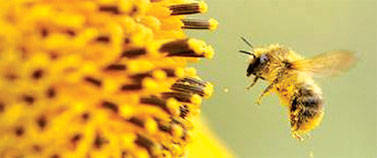No ban on pesticides that 'threaten bees'
European and American reports say nerve agents may be a danger, but
the UK goes on using them.
Nerve-agent pesticides should not be banned in Britain despite four
separate scientific studies strongly linking them to sharp declines in
bees around the world, Government scientists have advised.An internal
review of recent research on neonicotinoids - pesticides that act on
insects' central nervous systems and are increasingly blamed for
problems with bee colonies - has concluded that no change is needed in
British regulation.
 The British position contrasts sharply with that of France, which in
June banned one of the pesticides, thiamethoxam, made by the Swiss
chemicals giant Syngenta. French scientists said it was impairing the
abilities of honey-bees to find their way back to their nests. The Green
MP Caroline Lucas described the British attitude as one of "astonishing
complacency".Concern is growing around the world that the chemicals may
affect the ability of bees to pollinate crops, something that would have
catastrophic consequences for agriculture. The British position contrasts sharply with that of France, which in
June banned one of the pesticides, thiamethoxam, made by the Swiss
chemicals giant Syngenta. French scientists said it was impairing the
abilities of honey-bees to find their way back to their nests. The Green
MP Caroline Lucas described the British attitude as one of "astonishing
complacency".Concern is growing around the world that the chemicals may
affect the ability of bees to pollinate crops, something that would have
catastrophic consequences for agriculture.
Bee pollination has been valued at £200m per year in Britain and
£128bn worldwide.The French research was published in March in the
journal Science at the same time as another study by British researchers
from the University of Stirling, implicating neonicotinoids in the
decline of bumblebees.
The British team showed that production of queens, essential for
bumblebee colonies to continue, declined by 85 per cent after they were
exposed to "field-realistic levels" of another neonicotinoid,
imidacloprid, made by the German company Bayer.In January, the US
government's chief bee researcher published a study showing that
imidacloprid makes honeybees far more susceptible to disease, even at
doses so low as to be barely detectable.
And in April, a team from Harvard claimed to show that imidacloprid
was the culprit in colony collapse disorder, in which bees abandon their
hives en masse.
All four of these studies have been the subject of a British
Government review ordered by Sir Robert Watson, chief scientist at the
Department for Environment, Food and Rural Affairs (Defra) - which has
concluded that no action needs to be taken against the chemicals
concerned.
The reports were reviewed by the Chemicals Regulation Directorate
(CRD) which deals with pesticides, and the Advisory Committee on
Pesticides (ACP), the statutory body that advises ministers.
After considering a CRD paper on the research, ACP members agreed
that "while they could not discount the findings... they did not affect
the current regulatory decisions".
The ACP says more research is necessary "to clarify the papers'
findings, and their relevance to the UK field situation".
Government scientists have also taken into account a review of
Italian research linking bee problems with neonicotinoids, carried out
by the European Food Safety Authority.
The EFSA said it was "not possible to draw a firm conclusion" on the
research. Sir Robert Watson said: "What they've concluded is that there
is no reason at this moment to change regulation, because there is a
concern that the laboratory studies did not simulate adequately the
field conditions."
-The Independent
|


